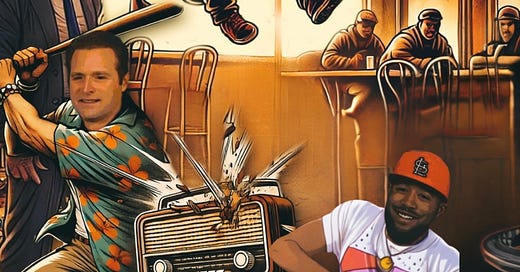The Story of the Right Hand, Left Hand
One day they'll be nice to Dexter Fowler, or at least civil
By Jeff Jones
The Chicago Cubs last won the World Series 67 years before Saturday Night Live premiered, so it came as no particular shock when they were so roundly feted after doing so in 2016. Bill Murray, after all, is both a legendary cast member and legendary Cubs fan. He was beaming as he appeared in costume as part of a barbershop quartet, accompanied by some of the newly crowned champion players – Anthony Rizzo, David Ross, and Dexter Fowler.
“You better get ready, it’s a brand new day,” Fowler crooned, taking the second line rather than his typical leadoff.
One problem in the foundation of the relationship between Fowler and the St. Louis Cardinals, or at least the city, is that neither was the other’s first choice, and both knew it. The other problem, the bigger, more sinful one, was always there, and Fowler knew that too. He did not point to it, but he was more than aware of it, and had it imparted to him as he was doing his due diligence in free agency.
Fowler wanted to go back to Chicago. How could he not? There he was a legend. It was comfortable. They could build success. But even then, even in the immediate afterglow of the parade, ownership was already quietly winding down the machine. Albert Almora had looked good in center down the stretch and through the postseason, and he was cheap. Ian Happ was on the doorstep, and he was going to hit.
The Cardinals, meanwhile, were also looking in Chicago for an outfielder for the top of the order – their initial focus was the south side of the city and Adam Eaton. He too was cheaper than Fowler. He’d posted three straight years of an OPS+ of at least 117. He appeared on MVP ballots in 2016, and he came with a little contractual control.
All of that is roughly why the Washington Nationals were willing to part ways with Dane Dunning, Lucas Giolito and Reynaldo López in order to acquire him. That trio would all pitch in the big leagues, and two of the three have put up distinguished careers, with Dunning still developing. That price, for the Cardinals, was astronomical. It would’ve been Jack Flaherty and Luke Weaver, plus more on top.
Pitching pays. Fowler just cost money.
Draft picks, too. Those had less value, though. The Cardinals were already set to be hammered as a result of the hacking scandal, and they knew the picks they’d lose in compensation would already be deflated in value. Fowler was never going to come at a better price, and everyone knew it.
The best offensive season of Dexter Fowler’s career arguably came in 2017 as a St. Louis Cardinal. In just 118 games he set a new career high in homers, and he posted an .851 OPS powered by a .488 slugging percentage. That goes unremembered, because of the way the season started. On April 17, after an 0-for-4 against Pittsburgh, his OPS was down to .358. He had just one extra base hit in the team’s first 13 games, and spent the rest of the season chasing it.
That he advanced as far as he did is remarkable, and is a testament to his work and success. But the slow start was the first image. Or second, if you include all the Cubs stuff. Or third, if you also start with the other thing. The bigger, meaner, uglier thing.
Year one, bad start. Year two, bad everything. Fowler moved to right field in 2018 and struggled the whole season. He was only healthy enough to play 90 games, he produced little on the field, and found himself off the field embroiled in one of the biggest farces of misunderstanding that has ever gotten a big league manager fired. That, and the manager’s eagerness to eat his own foot.
Fowler was at his locker when the clubhouse opened the day Mike Matheny was fired. He was always available and accessible if necessary, but he knew how to be in the room just enough to say he’d been in the room. Not that Sunday morning. He patiently answered every question, gave Matheny grace, and turned focus back toward the team. Consummate professional and teammate.
He was certainly the latter as a Cardinal. To call Marcell Ozuna’s career turbulent would be to grossly undersell it, but he kept it together in St. Louis (as a Cardinal, anyway). Fowler played no small part in that. Harrison Bader grew into a big leaguer and had a wealth of experience to lean on next door. Kolten Wong was ready to face the market when it came. There are certainly more examples than I know.
It seemed not to matter that Fowler was a dead on league average hitter in 2019 – .750 OPS, 100 OPS+. By the end of 2018 and the season’s ugliness, and always still the other thing, fans were done with Fowler, and he was not unaware. After that came the pandemic, and then a brief cameo in the Nolan Arenado trade drama, and then injury, and now retirement.
He’s done TV and events for the Cubs. Of course he has. He’s a legend there. But he did more here than he got credit for, for any number of the obvious reasons why, and there’s something to remember about that.
Jeff Jones has covered the Cardinals for the Belleville News-Democrat since 2019. His work has also appeared in Sports Illustrated and on MLB.com.




